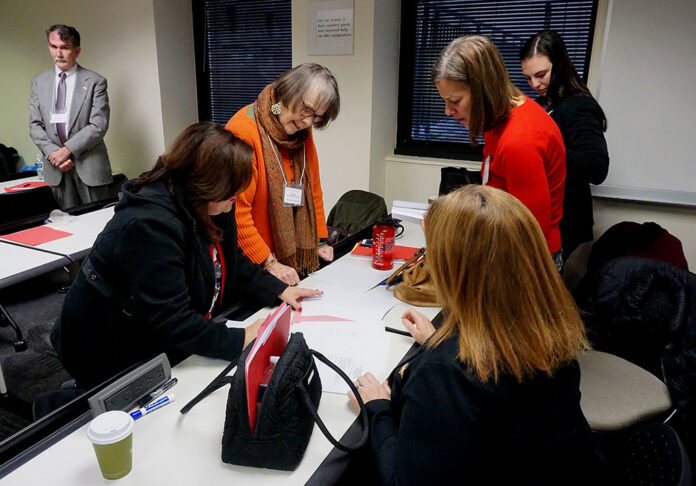More than 30 educators and five students from colleges around Virginia visited almost 90 legislators’ offices this week to advocate for higher education initiatives.
Higher Education Advocacy Day, held Thursday, included faculty from James Madison, George Mason, Virginia Commonwealth and Virginia Union universities as well as community colleges around the state.
Access to affordable higher education was a key talking point. Gov. Ralph Northam’s proposal for the upcoming budget increases financial aid for eligible students by more than $45 million. The governor’s proposal also includes increasing support for the Virginia Tuition Assistance Grant Program (TAG), which currently provides up to $3,400 in tuition for undergraduate students attending private, nonprofit colleges in Virginia. The grant would increase to $4,000 per undergraduate student.
“We believe these are important investments in access to higher education and urge the General Assembly to adopt these budget proposals,” organizers said in their talking points.
Another concern for educators was faculty compensation. Virginia’s college faculty salaries are lower than salaries at peer institutions. Organizers said competitive salaries are key to retaining quality educators and researchers.
“If we invest in education, there will be higher returns,” said Patricia Cummins, professor of world studies at VCU.
Educators also lobbied for House Bill 36, patroned by Delegates Chris Hurst, D-Montgomery and Danica Roem, D-Prince William. This bill ensures student journalists the right to exercise freedom of speech and the press in school sponsored media. Sen. David Marsden, D-Fairfax, introduced the companion bill in the Senate, SB80.
“Journalism is not public relations for a school system,” said Roem, a former journalist for the Gainesville Times and the Prince William Times. “Just because an administration official doesn’t like your story does not mean they should have the ability to censor what you are trying to reveal or what you are trying to report.”
Attendants also advocated for SB220 which allows individuals registered under the Deferred Action for Childhood Arrivals program to receive in-state tuition at public colleges. Meanwhile, HB 1179, gives refugees and those with Special Immigrant Visas who reside in the commonwealth the right to apply for in-state tuition at such institutions.
Educators also anticipate there will be bills to address the Virginia Supreme Court’s decision in Transparent GMU v. George Mason University in which the court found that the university’s fundraising foundation is not a public entity and therefore not subject to Freedom of Information Act requests.
“These bills would make it statutory that a foundation is ‘of the public body,’ and thus subject to FOIA requests,” according to the talking points. “We will support this legislation.”
Event organizers also were concerned about certain bills, including HB 228, sponsored by Del. Nicholas Freitas, R-Culpeper. The bill allows students or student organizations to sue colleges or their employees for violating laws relating to campus free speech.
“Virginia law already protects students’ First Amendment rights, including the right of student organizations with a religious or political mission to limit organization leadership to persons committed to that mission,” stated the talking points. “Presumably students already have the right to seek legal action. Introducing specific language into Code seems to invite judicialization of internal management of student life.”
By Jeffrey Knight / Capital News Service

